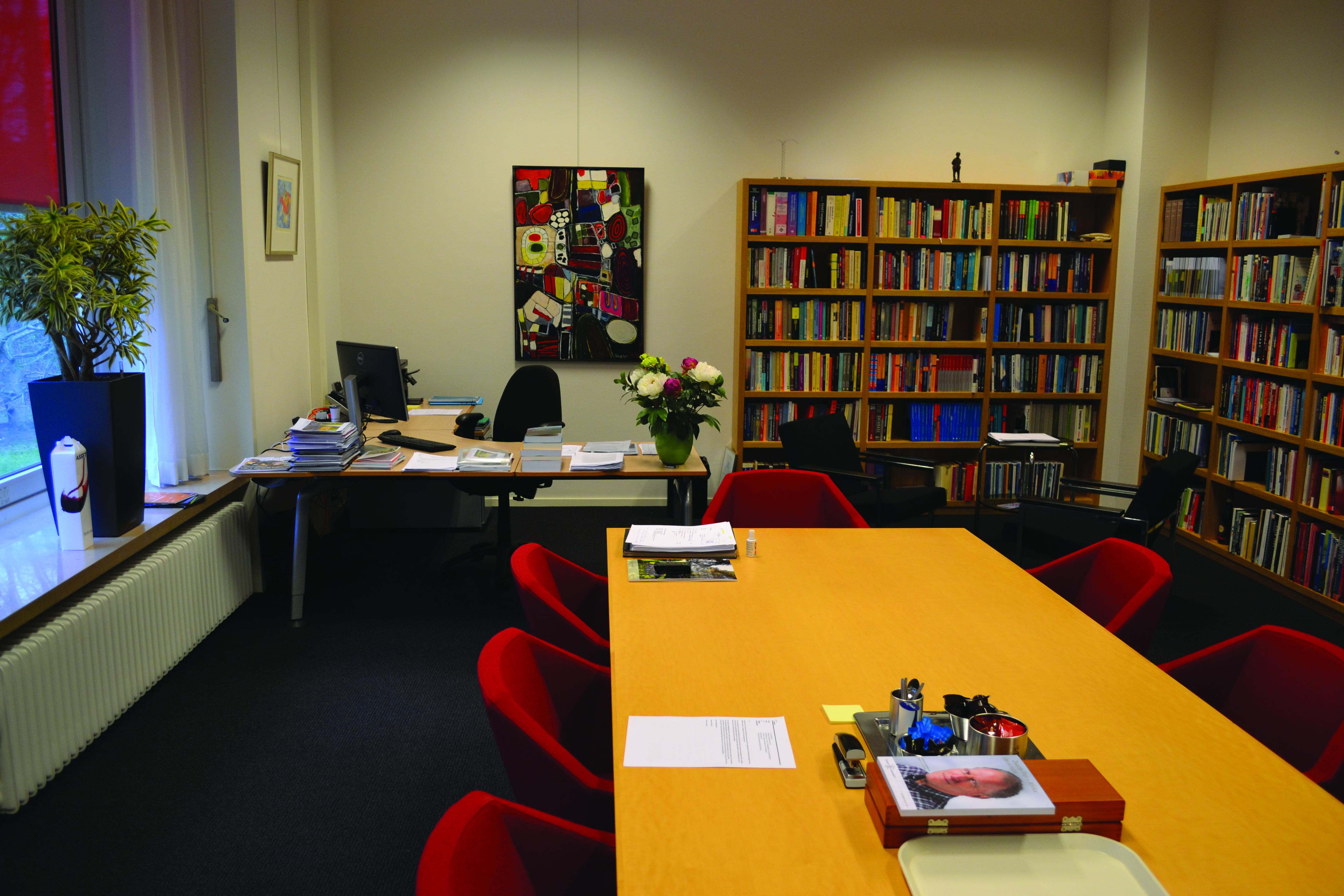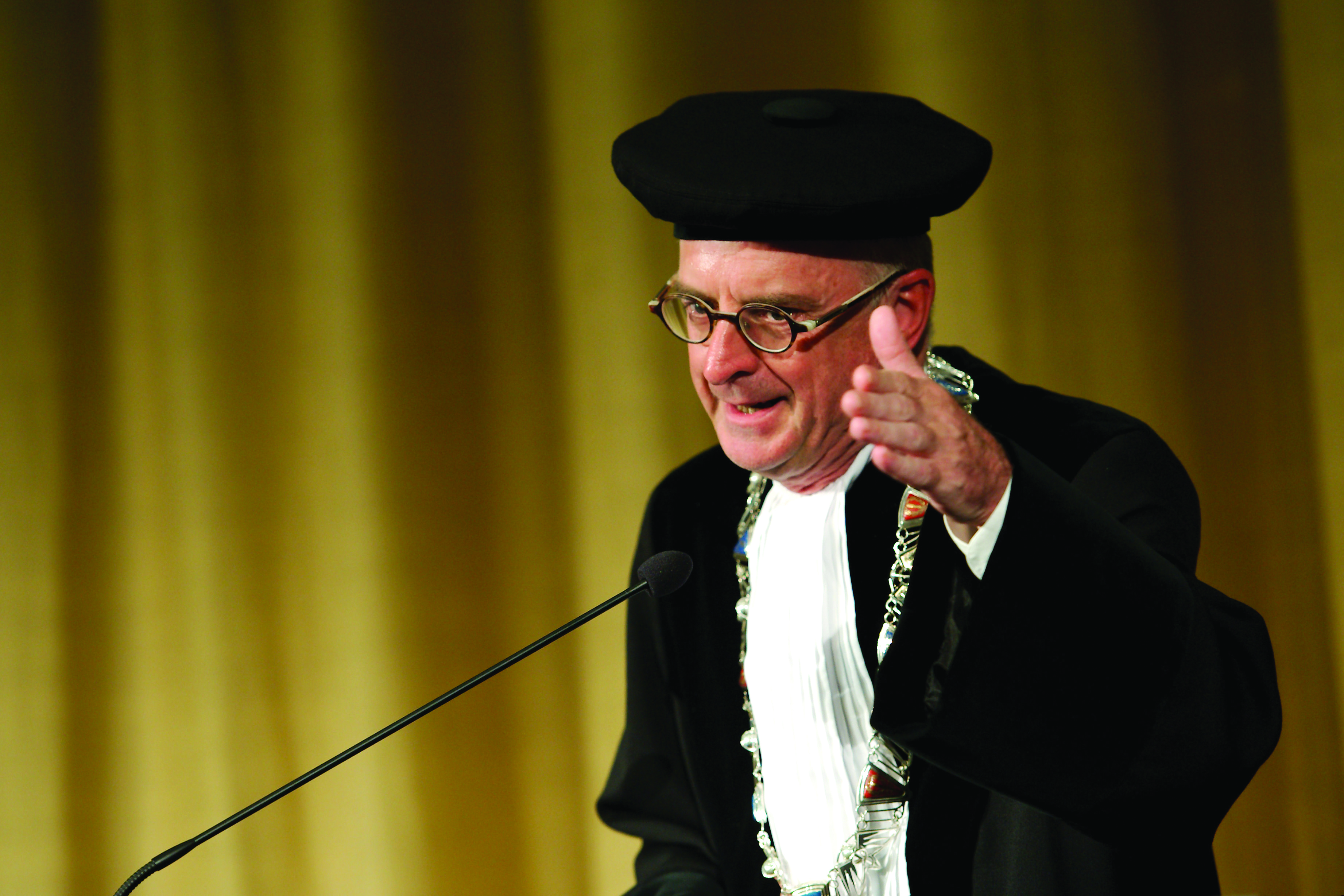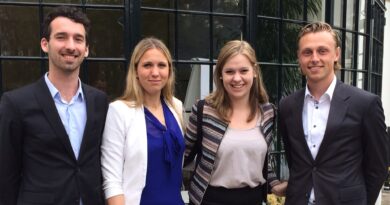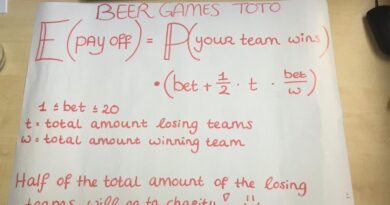From Research to Rector
His name will certainly ring a bell to students, but who exactly is Emile Aarts, what does he do at our university and what is his background? Nekst talked with our new Rector Magnificus about the university, mathematics and advancing society. Prof. Aarts: “We like to talk, but our debates should be sharper.”
Career Emile Aarts
- 1983: Obtained PhD in Groningen, after studying physics in Nijmegen
- 1983-2012: Worked at Philips Research, the last couple of years being Chief
Scientific Officer - 1991-2012: Part-time professor at Eindhoven University of Technology (TU/e)
first in computing science, later in industrial design - 1997-2003: Senior consultant at CQM
- 2012-2015: Dean of Department of Mathematics and Computer Science at
TU/e - 2015-now: Rector Magnificus of Tilburg University
The life of a rector is undoubtedly a busy one, but what does a typical day actually look like?
I usually have breakfast at around 07.30 hours together with my wife, my daughter is at the age that she has already left home, and afterwards I check my email from 08.00 to 08.45 hours. When I leave my home, rush hour is mostly over, and depending on the traffic I arrive at the university between 09.30 and 10.00 hours. Most often, I have conversations all day, such as interviews like this or one-on-one conversations. This then ends at around 18.30 hours. Of course, all of this is subject to change due to early appointments or meetings elsewhere. My three most important tasks are education, research and valorization, and as such the conversations usually concern these topics. I am not responsible for finance, administration and buildings, amongst others. What I am particularly happy with, is that communication is part of my portfolio, which is a topic I like, and also think is very important.
Which of these tasks do you like most?
We generally do not talk about what we like most. All three parts have their charms, and also have their downsides. We try to have a clear distinction between shape and content in a discussion, and not let emotion play a role in this. Let me give an example. Due to miscommunication, this interview started a bit later than originally planned, which can be seen as a problem. The discussion about shape is very difficult. This would entail the fact that you might have the idea that we did not take you seriously and you therefore cannot have a meaningful discussion with me, as you might feel offended. There is nothing I can do about that right now. The conflict on content, however, can be solved. It would simply mean that we discusses how to solve this, I for example can suggest to extend this interview beyond the original ending time. We try to stay away from the shape discussions and focus on the content. Now, concerning your original question. If I really have to pick one task, I choose valorization; it is in a very early stage at this university, and there is still much to do. I like to build things.
Why did you want to become rector?
There were several contacts between Tilburg University and me and I became more and more interested in its backgrounds. At the time, I was already involved with Tilburg University, due to its cooperation for the data science initiative with Eindhoven University of Technology (TU/e), where I was dean of the department of Mathematics and Computer Science back then. When I was working for CQM, I also met prof. Den Hertog, with whom you are familiar. I was thus not a complete stranger to Tilburg University, and knew its potential to become large in data science, which I found interesting. It was all very well developed, making it much easier to start collaborations with other parties.
After obtaining your PhD, you started working in corporate life at Philips. That is not per se a normal move, right?
I first started off as a ‘pure’ scientist. Being part of the flower power generation, there was a huge gap between universities and the corporate world. I really had to justify myself to my friends for what I was going to do at Philips, as it was not a normal move back then. On the other hand, my job at Philips was not the average job in the corporate sector. Philips Research was known as the largest private university in Europe. There was no real business culture and we had a lot of freedom. When I started working there, my boss told me: “Okay, settle yourself, take a good look around, and tell me after one year what you would like to work on.” This freedom turned out to work really well and the number of new innovations that resulted from our department was really astonishing.
It turns out that you have done research in many areas, including physics, mathematics, data science and innovation. Can you tell us some more about that?
At Philips Research, the general tendency was to research what you have affinity with and what sparked your interest at that moment. My research field is originally algorithmics, stemming from theoretical physics. The involved mathematics concerned discrete mathematics, which you will be familiar with: discrete structures, such as graphs and numbers. Once things start to get continuous, and involves subjects such as integral and differential calculus, I get less enthusiastic. Of course, I know what it is about, but only when I can count things I start to get really interested. And the concept infinity! If I ever have to give a last lecture, I will talk at least a quarter of an hour about infinity.
I only come to peace when I am allowed to be at the faculty of economics
But it is true that there have been quite some switches in research topics. When I was head of the department at Philips, whenever we were recruiting we really selected people on flexibility, to predict if they would be able to work on several different topics. Basically, we looked for what we now call 21st century skills. This culture lead to very diverse researchers.
Over the years you gradually switched to the academic world. How and why did that happen?
At some point, the whole future of the Philips Research division was uncertain. As you probably know, Philips split up recently in a lightning division and a health division. Nowadays it is not the large company that it used to be. Compared to when I started there, the number of employees has decreased from 360,000 to 100,000. We saw that this trend came up and many people in my department found jobs elsewhere. I was already connected to the TU/e for almost 25 years as part-time professor. It was thus a small step to completely switch to the academic world, as dean of the Department of Mathematics and Computer Science.
You recently became Rector Magnificus of our university, after working in the technology world for a long time. What did you experience as the major differences between the TU/e and Tilburg University?
I can tell you one thing: the step from Philips Research to the TU/e was much smaller than from TU/e to Tilburg University. Why this is? This is due to culture; the end product of a student at the TU/e is an engineer. What is the word that best describes graduates of our university? There is no such word, but we came up with one: entrepreneurial thinkers. We have a humanities, a philosophy and also a theology department. I only come to peace when I am allowed to be at the faculty of economics, as I can actually understand that, for it is more beta science aimed. But also the organizational structure is different. I am still not used to that, and lately I have decided that I will not get used to it either.
Let me give you an example to illustrate this difference in culture. When I was working my way through the application rounds, I often drove here in the end of the afternoon. When I left Eindhoven, the billboards at TU/e would display the news that the Stella Solar Car had set a new record, and when I arrived in Tilburg, the billboards displayed: “Should the Netherlands participate in bombings in Iraq?” I found this such a striking example. On the one hand, the technology and innovation is nice, and I do miss that in some way. But on the other hand, at this university we really get to address the big societal challenges and issues, which I find fascinating as well.
Perhaps your most ‘eye-catching’ idea so far is ‘Advancing Society’. Can you explain what you mean by that?
I am happy that you bring up this topic, it has become an interesting debate recently. When I started discussions at the university, I started to understand that the concept of understanding society is very important. However, those people told me at the same time: “Suppose we are 100 percent successful in understanding the society, we know everything there is to know, and we do not do anything with this knowledge. That is not a good thing.” I agreed with this statement. We have stretched the concept of understanding society, and added advancing society to this. At some point we arrived at a debate, in which some people stick up for just restricting ourselves to understanding, whereas others say that we have to go all the way, and immediately go for advancing society. It is quite remarkable that in this division most philosophers are sticking to understanding, as they state that once we start to use our knowledge to influence society in some way, we do this from some sort of ideology. They state that we should put all the ingredients for the meal on the table, and indicate for every part what it is, but we should not go as far as to put together a menu. I am not yet sure whether I agree with this, but it is certainly an interesting idea.
I would like that every student has the feeling that the university centers entirely around him or her. You may call us to account on that
Let me give an example of why I am not yet sure about this. Prof. Lans Bovenberg, one of our highly qualified professors of the TiSEM faculty, has recently received a grant to design a whole new economics study program for high school students. He is putting all his knowledge in this project, creating a lot of new study materials, and it is his ambition to have one in three high school students who take economics classes participate in this program in 2020. That is what I call advancing society, and I cannot see any way in which Lans is doing this influenced by some sort of ideology.
While on the topic of debates, we as a university talk a lot with each other, but do this in a careful way. This often leads to discussion ending without a clear conclusion. It is thus that we have declared that 2016 will be the year of the dialogue, which we introduced during the Dies Natalis. Did you not attend the Dies Natalis? No? Shame on you! It is our plan to have tough debates with constructive conclusions, meaning that we can have debates that are a bit sharper, but we do not say our goodbyes before we have reached some form of consensus. We are currently organizing dialogue forums along this formula, together with study associations and the student fractions, to debate on topics of their choice.
Finally, prof. Aarts sets himself a challenge: “I would like that every student has the feeling that the university centers entirely around him or her. You may call us to account on that.”
We would like to thank prof. Aarts for finding time in his busy schedule for this interesting interview, and we wish him the best of luck with his plans for our university.
Text by: Stefan ten Eikelder






